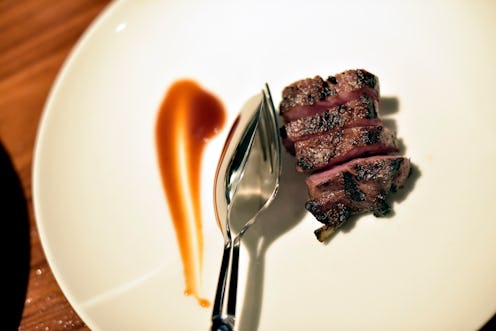Life
A New Study Linked Red Meat To Early Death (Again), But Here’s Why You Shouldn’t Worry

Everything is bad for you in excessive amounts. Moderate consumption of wine has benefits, but too much rosé all day can cause organ damage. Regularly exposing yourself to sunlight gives you a vitamin D boost, but too much sun exposure can put you at risk for skin cancer. Red meat can be a valuable source of protein, but going on an all-meat diet increases your risk for cancer and chronic disease. In fact, a new study published in the journal The BMJ found that excessively eating red meat is linked to early death.
The study followed 53,553 female nurses and 27,916 male nurses over several decades to see if their consumption of red meats, particularly processed red meats, had any correlation to early death from cancer or cardiovascular disease. The types of meat assessed included beef, pork, and lamb as a main dish, and hamburger, beef, pork, or lamb as a sandwich or mixed dish. Processed meats included bacon, sausage, hot dogs, salami, and bologna.
"Higher red meat consumption was associated with unfavorable plasma concentrations of inflammatory and glucose metabolic biomarkers," the study found. That being said, replacing red and processed meats with other protein sources like eggs and plant-based protein could lower your risk of early death from cardiovascular disease and some cancers.
If you are a meat eater, you may be wondering how much meat is too much. According to the World Cancer Research Fund, meat provides the body with valuable nutrients like protein, iron, zinc, and vitamin B12. However, they recommend eating no more than 12-18 ounces of red meat per week, and little-to-no processed meat.
"The evidence on processed meat and cancer is clear-cut. The data shows that no level of intake can confidently be associated with a lack of risk. Processed meats are often high in salt, which can also increase the risk of high blood pressure and cardiovascular disease," Professor Martin Wiseman, World Cancer Research Fund International’s medical and scientific adviser, is quoted as saying on the WCRF's website.
The MD Anderson Cancer Center also noted that there is no reason to cut red meat from your diet. Instead, adhere to the no-more-than-18-ounces-per-week rule, and supplement with plant proteins (like beans), chicken, fish, fruits, and whole grains.
"Eating too much red meat can increase colon cancer risk," Mary Ellen Phipps, a wellness dietitian at MD Anderson, said on the MD Anderson website. "Try to limit red meat to 18 ounces or less each week to reduce your risk."
If you're not sure what 10 ounces of red meat looks like, MD Anderson provides an easy-to-follow guide. For example, you can have what's equivalent to the size two softballs of red meat per week. If you're eating bacon or sausage every day with breakfast, or a BLT is your go-to sandwich for lunch, consider replacing that processed meat with something else.
There are vegetarian bacon options, though I haven't tried them. But I have had vegetarian sausage, and it's actually quite delicious. Some people might decide to forgo meat altogether, but it's really a personal choice. I've tried to adhere to vegan or vegetarian diets in the past, and I felt physically and emotionally drained.
On the other hand, my roommate and I never cook meat in our apartment. This means we only eat it when we go out, which helps us ensure we're not over indulging. While a good steak is certainly delicious, when it comes to red meat, too much of a good thing can be bad for you in the long run.